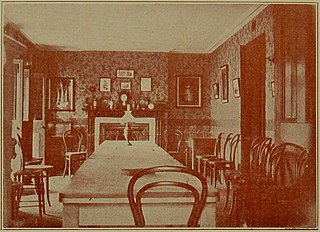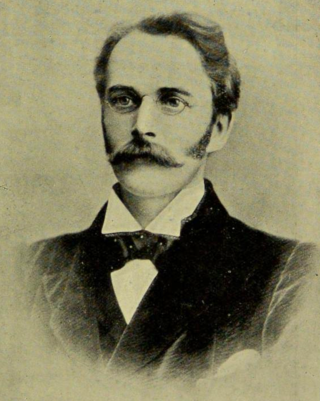
The Vegetarian Society of the United Kingdom (VSUK) is a British registered charity. It campaigns for dietary changes, licenses Vegetarian Society Approved trademarks for vegetarian and vegan products, runs a cookery school and lottery, and organises National Vegetarian Week in the UK.

Alice Marie Drakoules was a British philanthropist and activist. She was a notable organiser and supporter of humanitarian, animal welfare, and vegetarianism organisations, including the Vegetarian Society, Humanitarian League, Animal Defence and Anti-Vivisection Society, and the League Against Cruel Sports.

Ernest Bell was an English publisher, writer and activist. He was an advocate for animal rights and welfare, vegetarianism, and humanitarian causes.

Sidney Hartnoll Beard was an English fruitarian, vegetarian activist and writer. He was President of the international animal rights society, the Order of the Golden Age.

John Smith was an English banker, activist, spiritualist, and writer. He was the manager of the York City and County Bank, Malton. A prominent activist for vegetarianism, Smith served as president of the Hull Vegetarian Association and authored the influential Fruits and Farinacea. He also authored The Principles and Practice of Vegetarian Cookery.

Charles Walter Forward was an English activist, writer, and editor, notable for his advocacy of animal rights and vegetarianism. Forward made significant contributions to the vegetarian movement and is best known for his 1898 work, Fifty Years of Food Reform, which was the first book to document its history.

Josiah Oldfield was an English lawyer, physician, activist, and writer. He promoted his own variant of fruitarianism, which was virtually indistinguishable from lacto-ovo vegetarianism. Oldfield was a prolific writer of popular books on dietary and health topics. He also served in the Royal Army Medical Corps and received the Territorial Decoration for his service in World War I.

Henry John Williams was an English Anglican priest and activist for humanitarianism, animal rights and vegetarianism. He was the founder of the Order of the Golden Age, an international animal rights society.

Albert Broadbent was an English activist, writer, editor, publisher, lecturer, and restaurateur. Broadbent was a prominent advocate of vegetarianism. He served as Secretary of the Vegetarian Society and edited The Vegetarian Messenger and Health Review, playing a significant role in promoting vegetarianism on an international level. His work included extensive lecturing, producing publications advocating for a vegetarian diet, and the establishment of vegetarian restaurants aimed at improving women's social standing and providing affordable meals to poor people.

Joseph Wallace was an Irish–British alternative medicine practitioner, patent medicine creator, writer, and activist. He developed the "Wallace system", promoting a vegetarian diet free of fermented foods, and sold patented medicines alongside consultations. With his wife, Chandos Leigh Hunt, he co-authored Physianthropy (1885) under the pseudonym "Lex et Lux".

George Dornbusch was an Austrian-British merchant, publisher and activist. He was an early advocate for vegetarianism and veganism, and various other causes including abolitionism, anti-vaccination, temperance, women's suffrage and the peace movement.

Bertrand Peter Allinson was an English physician, naturopath and writer. He was also an anti-vaccination, anti-vivisection and vegetarianism activist.

Job Caudwell was an English publisher, bookseller, editor, and activist. He edited temperance and reform literature and advocated for temperance, vegetarianism, and against vaccination. Caudwell also published and edited multiple temperance periodicals and authored a vegetarian cookbook, Vegetarian Cookery for the Million. He played significant roles in the London Vegetarian Association and the Anti-Compulsory Vaccination League. He ran a homeopathic institute from his publishing office. Elected a Fellow of the Royal Society of Literature and the Royal Geographical Society, he was also a member of the Victoria Institute.

James Simpson was a Bible Christian deacon and activist for a number of causes. He was active in the vegetarianism, temperance, anti-tobacco, anti-Corn Law and peace movements. Simpson co-founded and served as the first President of the Vegetarian Society.

Emil Weilshäuser was a German publisher, writer, translator, and lebensreformer who advocated for vegetarianism. He was a leading figure in the early German vegetarianism movement and published and translated a number of English-language works on vegetarianism into German. He also authored several works on the subject, including a vegetarian cookbook, which went through several editions. Weilshäuser served as President of the Vegetarian Society of Germany from 1882 to 1885 and was a member of the British Vegetarian Society and Victoria Street and International Anti-Vivisection Society.

Edward Dolby Shelton was an English printer, publisher, and activist. He was known for his advocacy of temperance and vegetarianism. Shelton's career included managing Alexander Thomson's printing business in Manchester and co-running a printing and publishing venture on the Isle of Wight. He notably managed the Ventnor Vegetarian Hotel there, which hosted prominent figures like Mahatma Gandhi. Later in life, he focused on business and church activities in Ely, Cambridgeshire, while continuing to promote vegetarianism alongside his wife, Frances.

Frances Sarah Louisa Boult was an English activist, magazine editor, and cookery instructor. She advocated for temperance and vegetarianism. Boult was the founder of the Ivy Leaf Society and was the editor of its magazine The Children's Garden. She also founded and served as vice-president of the Northern Heights Vegetarian Society.

Arthur Edgar Harvie was an English Unitarian minister and activist for anti-vivisection and vegetarianism.

Joseph Knight was an English activist and writer. He was an advocate for temperance and vegetarianism, founding the Scottish Vegetarian Society and serving as secretary of the Vegetarian Society. Additionally, he authored several pamphlets and articles on vegetarianism, and delivered lectures promoting the cause.

George Cosens Prior (1856–1937) was an English solicitor, notary public, Unitarian minister, and activist. He led a prominent law firm in Portsmouth, managed key trusts, and maintained a large private practice. Prior was an advocate for temperance and vegetarianism. He served as president of the Portsmouth Gospel Temperance Union and Portsmouth Vegetarian Society. In 1904, following bankruptcy, Prior was convicted of misappropriating client funds and sentenced to five years' penal servitude.




















